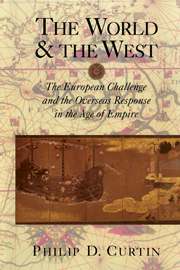Book contents
- Frontmatter
- Contents
- Preface
- Part One Conquest
- Part Two Culture Change and Imperial Rule
- Part Three Conversion
- 7 Christian Missions in East Africa
- 8 Varieties of Defensive Modernization
- 9 Meiji Japan: Revolutionary Modernization
- 10 Ottoman Reactions to the West
- Part Four Independence and the Liquidation of Empires
- Index
7 - Christian Missions in East Africa
Published online by Cambridge University Press: 05 June 2012
- Frontmatter
- Contents
- Preface
- Part One Conquest
- Part Two Culture Change and Imperial Rule
- Part Three Conversion
- 7 Christian Missions in East Africa
- 8 Varieties of Defensive Modernization
- 9 Meiji Japan: Revolutionary Modernization
- 10 Ottoman Reactions to the West
- Part Four Independence and the Liquidation of Empires
- Index
Summary
Islam, Christianity, and Buddhism have all played a major role in cultural convergence over the past two thousand years or so. It would be interesting, but far beyond the theme of these essays, to pursue the history of comparative proselytization, seeking to find why these three religions are so outstanding in their ability to acquire converts in foreign cultures. The answer would certainly be mixed, but a first approximation would be that the major religions of the modern world are those with a doctrinal basis that includes an effort to attract believers; proselytization at some level is a defining characteristic of the present world religions. On the other hand, the historical record contains far too much evidence of fruitless missionary effort for this to be the only explanation. Much religious change, perhaps most, must be explained as a response on the part of the converted.
The initiatives of Christian missionaries in the past century and a half were inevitably intertwined with the European conquests of that same period. The Christian message often appeared simultaneously with the victory of the Western military and the establishment of European empires. The way in which these interactions worked themselves out in East Africa generally and with the kingdom of Buganda specifically is the subject of this chapter. East Africa is not necessarily typical even of other parts of Africa, and Buganda was a special case, but developments in this small state illustrate the complexity of the social and political conditions within which cultural conversion took place.
- Type
- Chapter
- Information
- The World and the WestThe European Challenge and the Overseas Response in the Age of Empire, pp. 111 - 127Publisher: Cambridge University PressPrint publication year: 2000



